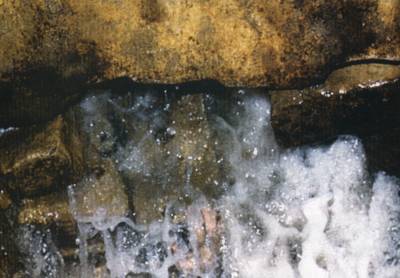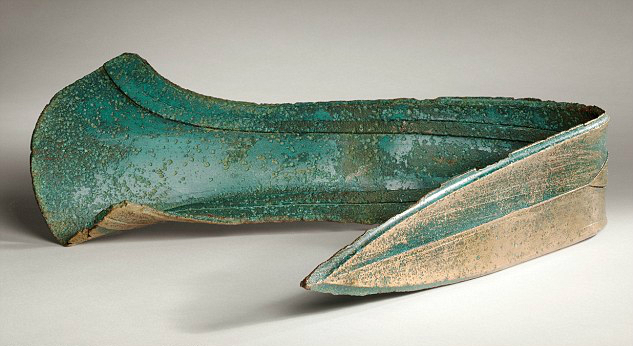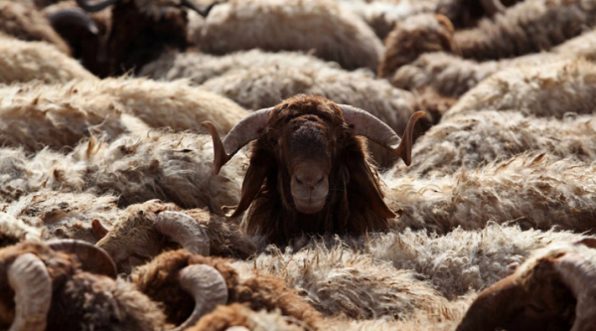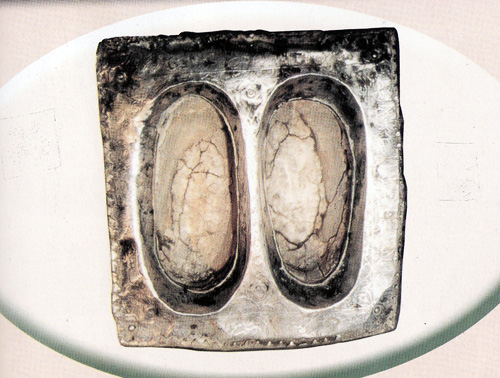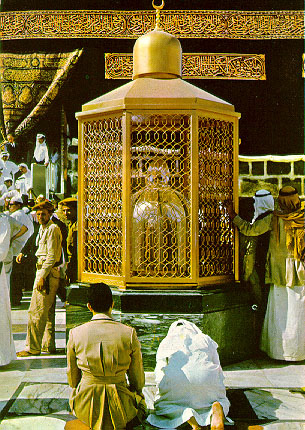Eid Mubarak – Ibrahim (AS) Hajar (AS) & Ismail (AS) Story
Eid Mubarak – Ibrahim (AS) Hajar (AS) & Ismail (AS) Story
This extract is taken from Lore of Light by Hajja Aminah Adil (QS) with their permission, May Allah Almighty bless and raise them more, of Sayyidina Ibrahim (AS) Hajar (AS) & Ismail (AS) and the circumstances of Zam Zam and the Eid celebration.
===
(*-Alayhi Salaam)
She spoke to Ibrahim*: “Go take them away! Out of my sight with them, I cannot bear their presence here.” Ibrahim* replied: “Oh wife, what shall I do with them? Hajar* was a slave girl and she has no place to go.” But the angel Gabriel* appeared to him an ordered him to heed Sarah*’s words and to do as she bade him. She knew not what she was saying, but there was nonetheless wisdom in her words. Her said: “Put them upon a camel, and take with you some food and water and set out with them after the dawn prayer.” Ibrahim* did as the angel revealed to him.
They set out in the early morning and rode along until nearly midday. By that time they had come to waterless place in the desert, where there were no trees or shrubs nor any living, green thing, only mountains, stones, and sand. In this place the camel chose to sit down. Ibrahim* then dismounted and lifted Hajar* from the saddle. She looked around and asked: “Oh Ibrahim*, is this where you want to leave us?” “I am under the Command of my Lord”, said he. “I confide you to take care of Him who has created you and ordained your provision.” With that he left, for he had not been ordered to say any more. He returned to his home before the high noon.
Hajar* and her son remained where he had left them. For a day or two she ate of the provisions she had brought along with her and Ismail* was still a suckling babe. She ate and drank all she had, and when she had done, there was no more and it was extremely hot in that place. She grew very thirsty. She left the baby where she had sat and went in search of water. She ran to a nearby hill which is called Safa, stood on it and looked, then she ran down and up another hill, which is called Marwa.
On her way there was one place from where she could not see her son, and because of this she ran quickly for a few steps, so as not to lose sight of him….. Therefore it is obligatory for us on Hajj to run when we reach this place between the hills of Safa and Marwa. Seven times in all she ran to and from between the hills, and her baby was already turning blue from crying hard. Hearing his voice she grew very afraid, fearing that the birds of prey – that she saw circling overhead might have attacked him.
As she stretched out to look, she saw her son strike the ground with his foot. Where his foot struck the ground, a spring of water gushed forth and began to flow. Hajar* was afraid that the precious water might run into the sands before she had a chance to drink form it, so she rushed to pile sand around the source to contain it and to form a pool, and to this day it is found there in a well called Zam-Zam.
Hajar* was grateful and thanked Allah for this miracle, and she drank from the water and gave her son to drink, then washed her hands and face and prayed. “Oh Lord,” she said, You have saved us by this well of water so that we should not die of thirst, but what shall we eat here in this lonesome place?” In response a voice was heard coming from the well of the Zam-Zam: “If you are thirsty, drink this water, and your thirst will be quenched; if you are hungry, drink this water with the intention of eating, and you hunger will be appeased; and if you are ill, drink this water with the intention of finding healing. Allah Almighty will heal you. Whatever are your needs, the Zam-Zam well will fulfil them.” Hajar* thanked the Lord for His great Mercy and remained living there by the well, drinking from its miraculous water which sufficed her every need.
Allah Almighty intended to make that place a centre of worship for all times and peoples to come so it was in accordance with the Divine Plan and not from lack of compassion that Ibrahim* had left Hajar* with his son in such a desolate place.
====
Prophet Ibrahim & Prophet Ismail (AS) – The Sacrifice
Ibrahim* came from time to time to that place to visit Hajar* and his son. But his wife Sarah* had made him promise that he would not stay there, would not eat with them nor even dismount from his camel. When Ismail* was seven years old or according to some narrations 10 or 11 years old, the Lord sent Gabriel* to Ibrahim* to remind him of the vow he had made before Ismail* was born to him : that he would sacrifice to the Lord that which he loved best in the world, if only He granted him a son.
Ibrahim* was reminded of his forgetfulness, and he instantly slaughtered 100 sheep and sacrificed them on the alter for they were the best thing he had. The Divine Fire descended from heaven, and they disappeared from sight, and Ibrahim* knew by this sign that his sacrifice had been accepted. But again the Lord sent the angel to Ibrahim* and told him that he had not yet fulfilled his vow.
The angel said to the lord: “Oh my Lord, I love Your prophet Ibrahim* so very much and it hurts me to give him pain and unwelcome news; please do release me from the obligation of bringing him these tidings.” So the Lord revealed to Ibrahim* in a dream that he had not paid his debt to Him in full. The next day, Ibrahim* went and slaughtered a thousand camels. Again the fire descended and transported them away, and Ibrahim* knew that his sacrifice had been acceptable.
The third night, Ibrahim* again saw a dream in which the Lord reproached him for not having met is obligation. So Ibrahim* went and slaughtered 100 horses, Arabian thoroughbreds, of which he was very fond. And again the fire took them al away. The fourth night, again he saw a dream, “Ibrahim*”, said the Lord, “You are not keeping your word which you have given to Me. For what you love most in the world are not your sheep, your camels or your horses, but it is your own little son. Until you have sacrificed him to Me, you will not have fulfilled your vow.”
This dream Ibrahim* saw repeatedly, 70 times during the night, and the dreams of the prophets are revelations of the truth, they are not whisperings of the Devil. Ibrahim* asked the Lord: “Oh my Lord, how shall I do this thing? How shall I tell Hajar* and Ismail*?”
But he was obedient and he took a rope and a knife, went to Hajar* and said to her: “Oh Hajar*, bathe our son and anoint him, colour his hands with henna and robe in clean, new clothes, for I wish to take him with me beyond the mountain where lives a friend of mine whom I am planning to visit.” Hajar* did as he told her and prepared Ismail* to go out with his father.
Shaitan, the accursed, was lingering nearby, and he went to Hajar* in the shape of a man and asked her : “Where is your son?” She replied, “He has gone with his father to visit one of his friends.” If that is so”, said the Devil, “why does he take with him a knife and a rope? No, I will tell you the truth of his intention : Last night he has seen a dream, and he believes it is a revelation from the Lord whereas it is nothing but the voice of the Devil. In this dram he was ordered to go and sacrifice his only son, and he has now gone to do that.” Hajar* replied: “My husband is a Prophet and a Messenger among the prophets – how should it be possible that he commit such a dastardly deed? “Go see for yourself then; and check up on him, I am telling you the truth.” She said: “if it is truly by the Command of the Lord, then we shall obey His Command,” for she was of strong faith, “If He commands me to give up my own soul, or my only son, I will obey. Ibrahim* does not receive voices from Shaitan, if he has gone to do this, then it must be a revelation from the Almighty.” She then recognised Shaitan for what he was and she drove him from her threshold, and cursed him.
In disguise the devil approached Ibrahim* as he walked along his way, and he saluted him and said: “Oh Ibrahim*, where are you going?” “I am going to see a friend.” “Why are you carrying a knife and a rope, if you are really going to visit your friend? Surely, if this were true, you would be bearing other presents. I will tell you what you are intending to do: You have seen a dream, and in accordance with this dream you are intending to commit a heinous crime, you are about to slaughter your own son, is it not so?” Ibrahim* recognised the speaker and said: “Depart from me, or accursed on,” and he drove him from his side. The boy Ismail* was running along ahead of his father, enjoying the fine day and happy to be on the outing with his father. Each time Ibrahim* looked at him he thought his heart inside of him would burst with the pain of what he had to do to him. So he said to the boy, “Oh my son, do walk behind me, it is more suitable.” Ismail* walked behind him and he pranced about his father, and played with him tugged at his cloak and fooled around as all little boys of his age have ever done – for he was happy that day.
Iblis who had failed in his attempt to sway both Hajar* and Ibrahim* into doubting, thought, “For sure I will succeed with this child,” and he did what he could to distract them and make them lose their way. When Ismail* stayed behind his father, he came to him and asked: “Where are you going today?” “I am going with my father to visit his friend.” “That is what you think little boy, but let me tell you what he is really doing to do: he is taking you to a certain place in the mountains to slaughter you there”. “What? My father, slaughter me?” “Have you not seen the rope and the knife which he carries with him?” For sure that is what he is planning to do.” Ismail* said to him “Go away, get your self gone! My father is a prophet and if he wants to slaughter me, now should I object or oppose him? Go away, for you are the Evil One!” But Shaitan did not leave him in peace, he attempted again and again to dissuade from his obedience with all manner of arguments. At last Ismail* picked up three stones from the ground and threw them at Shaitan, and one of them hit him in the eye so that he was injured. All this took [place in the valley of Mina, where we now perform the rite o stoning Shaitan during the Hajj.
At last they reached the place ordained, and Ibrahim* said to his son, in the words of the Holy Qur’an:
“………..and when he reached the age of running with him, he said, “My son, I see in a dream that I shall sacrifice thee; consider, what thinkest thou?” He said, “My father, do as thou are bidden; thou shall find me, god Willing, one of the steadfast.” (The Rangers, 100-150)
Ismail* voiced not one objection, neither did he doubt or hesitate for a moment. He was completely surrendered to his Lord’s Will. Ibrahim* placed his son on the ground in order to perform the sacrifice. Ismail* said to him, “Oh my father, do bind my arms and legs so that I might not commit an act of disobedience in spite of myself: for example, I might strike out with my arms or legs when I feel the pain of the knife, and I might hurt you thereby.” For man does not surrender his soul easily and willingly. He fights for his life with all his might. Then Ibrahim* wanted to carry out the Lord’s order, but he found he could not do it. Ismail* spoke again, “Oh father cover up my eyes with this piece of cloth so that you do not have to look at my face!” He tied the cloth around his head so that they could not see each other. Ibrahim* felt as if his insides were on fire.
He raised up the knife 70 times, but it did not cut Ismail*’s throat. Ismail* spoke again, “Oh my father, it seems you cannot kill me while you are facing me. Why not turn me around and try cutting from the back.” Ibrahim* tried this also, but still the knife would not cut Ismail*’s throat. He grew angry and hurled the knife at a stone, reproaching it for not cutting, although he had carefully sharpened its blade.
The knife then proved to be so sharp that it cut through the stone as if were a soft cheese. Ibrahim* scolded the knife and said, “What do you think you are doing, causing me the pain of 70 attempts to slaughter my own son? Allah Almighty then gave the knife a voice to speak with and it said: “Why did the fire not burn you?” “Because my Lord had ordered it to be cool and a safe for me.” “So you see, by being ordered but once the fire did not burn you; since you have taken me up, I have been ordered 70 times not to cut trough even a hair from the body of your son.” Ibrahim* spoke to the knife in the tongue of ‘Hal’, that is in a special state of consciousness, and if there had been people there, nobody else could have heard this speech. Ismail* was waiting on the sacrificial alter and he called “oh father, let us praise the Lord and glorify Him, perhaps He will make your task easier for you. “ He began saying. “Allahu Akbar, Allahu Akbar” – and Ibrahim* continued “La ilaha illa-Llah wa Allahu Akbar.” Then they heard a heavenly voice completing the phrase, “Allahu Akbar wa lillah-il-hamd.”
They then beheld the angel Gabriel* descending from the heavens, leading a ram. This ram was the ram of Cain and Abel. When Abel placed his offering on the later, it was transported into paradise and pastured there all this time, until it should be the ransom for Ismail*. Ibrahim* turned towards it and slaughtered it in Ismail*’s stead, then he remembered that his son was still bound upon the alter, and he turned to untie the ropes on his hands and feet. But he found they were already loosened and undone. “Who has untied these ropes?” he asked. “He who has sent the ram has also undone my bonds,” answered Ismail*.
Then Gabriel* said to Ibrahim*: “Oh Ibrahim*, the Lord wishes to grant fulfilment to three of your prayers. Pray for whatever you wish.” Ibrahim* said, “Oh Lord, I love the Nation of Muhammad**** I wish to pray for them.” How could Ibrahim* have knowledge of the Nation of Muhammad****? When he was very young and had not yet left his hiding place in the cave he looked up at the stars and the skis, and he perceived the whole Nation of Muhammad**** and he was also able to tell which of the seeds among them were going to be disobedient and transgressing. He prayed to the Lord to destroy these. But the Lord had answered him, “No do not pray against them, because I have given them four things: I forgive the wrong doers among them for the sake of those who do good; secondly, they may repent and return tome; thirdly, I forgive them through the intercession of their Prophet Muhammad**** and fourthly, ‘’Verily, I am the Forgiving, the oft-Returning.’ ”
~~~~~~~~~~~
“We called unto him, “Abraham, though hast confirmed the vision: even so We recompense the good-doers. This is indeed the manifest trial: And we ransomed him with a mighty sacrifice, and left him among the later folk ‘Peace be upon Abraham!’ “ (The Rangers, 105-110)
The Lord had promised to fulfil three of Ibrahim*’s prayers: firstly he prayed, “Oh Lord, have mercy on the Nation of Muhammad****!” Secondly he prayed, “Oh Lord, cause not the Nation of Muhammad**** to suffer!” And thirdly he prayed, “Oh Lord, forgive the Nation of Muhammad****.” All three prayers he prayed for the Nation of Mohammad** for he had been shown the Nation of Muhammad**** in a vision before he came to prophet hood.
After this Ibrahim* thanked the Lord and praised Him and said “Al-hamdulillah, the Lord has given me patience in this great trial!” Ismail* spoke up and said: “Oh father, my patience was yet greater than thine. You were willing to sacrifice your only son, but you may yet have other children after his death. I however, have only one life and one soul, and I was willing to give it up in obedience of my Lord’s decree. Therefore I am more generous than you.” “No, Ismail*, I am the more generous. My sacrifice was the greater one.” Said Ibrahim*, “for I was called upon to act, to sacrifice you with my own hand and seeing eye, while yours was but passive acceptance.”
The Lord then sent a revelation which reminded them that He, Allah, is the most Merciful of those that show Mercy, the Most Generous of the Generous. He had ransomed them both by sending them the heavenly ram, freeing one of them from the obligation of slaughtering his own son, the other from surrendering his soul to the knife. At the same time He taught them that Ibrahim*’s claim to generosity was the more justified, for the moment of death is endured only once, but the pain of having slaughtered his own son would have lasted and burned on in his heart until he died.
~~~~~~~~~~~~~~
According to one account the reason for Ibrahim*’s trial was this: One day guests came to Ibrahim*’s house and it was always his custom to slaughter an animal in honour of his guests. This time he had no sheep or goats, but he had a cow which had just calved. As Ibrahim* had nothing else to set before his guests, he took the newly born calf and slaughtered it in front of the eye of its mother, paying no heed to the tears and cries of the mother-cow. Therefore he was tried with the order to sacrifice his own son, and to feel the pain of this action.
~~~~~~~~~~~~~
According to another account, Ibrahim* once prayed against a group of extremely wicked and headstrong people, and they perished by the command of the Almighty. When Ibrahim* was ready to carryout out the sacrifice of Ismail*, a cloud of smoke issued from his mouth, as a sign of his burning heart. The Lord addressed him then: “Oh Ibrahim*, you heart is burning and wasted by pity for your one and only son whom I have ordered you to sacrifice – do you not think that He who has created and given life to His servants feels pain and pity whenever He destroys them? From this time on I forbid you to ever pray against any creature whom I have created.”
However, the case may have been, no person has ever been tested by the Lord in such a way, and had Ibrahim*’s heart not been full of faith in the Lord, he could not have borne such a trial.
~~~~~~~~~~~~
Therefore, Ibrahim* and his son Ismail* went home in great joy and gratitude. Ismail* returned to his mother Hajar* in Mecca and Ibrahim* to his wife Sarah* in Jerusalem. Ismail* grew up and got married to the daughter of the chief of the tribe living with them in Mecca, but she was not suitable for him. One day the prophet Ibrahim* came to visit his wife Hajar* and continued on to the house where Ismail* lived with his wife. Still he was true to his promise to Sarah* not to dismount from his camel on these visits. Ismail* was not at home when he came to the house, but a young woman answered the door. Ibrahim* asked about his son Ismail*. “Oh he is not here,” she said, “he spends all day out in the mountains and deserts.” have you anything to eat in the house to eat or drink?” asked the traveller. “What do you think, what kind of food should we have in a place like this? We barely have enough for ourselves,” she said in a rough tone of voice. Ibrahim* made ready to leave, and said to her: “Tell Ismail* when he returns that his father called, and this is his message: he approves of his house, but the threshold is not good, he should change it.”
With that he left her. Ismail* however perceived his father’s light from the distant mountains as he was departing. He ran down from there and arrived at his house. He could tell the traces of Ibrahim*’s light and he asked his wife, “Who has been here?” “An old man came to the door and asked for food and drink.” “What did you say to him?” “I told him that you were out and that we have nothing to eat or drink in the house.” “And what did he say when he left you?” “Oh, I had nearly forgotten, he spoke strange words; he said I should tell you that your house is very good, but that its threshold needs to be replaced. I don’t know what he meant.” “I know what he means,” said Ismail*, “my father is telling me that you are not to be my wife, and that I should send you away.” So Ismail* divorced this wife and he married another girl after that.
The next year Ibrahim* came again to visit Ismail*. Again he found him not at home, but a lovely young woman was outside the house. “Who are you?” he asked her. “I am the wife of Ismail*,” she answered politely. “And how are you today?” “Al-hamdulillah, praised be the Almighty, we are doing very well.” “Have you to eat and drink in your house?” “Oh father,” she said, “the Lord has provided for everything we need in the middle of the desert.”
“I am hungry,” said the traveller “bring me something to eat” “Will you not dismount, father? It will be more comfortable for you. Let me seat you in the shade of the house and wash your head feet from the dust of the journey.” “No”, he said, “I am bound by my word I must not touch the ground here with my feet.” So she brought out to him all she had in the house on a tray and held it up to Ibrahim*, sitting on his camel. He ate a mouthful of everything she had brought and prayed over the food.
When he had finished eating, she said: “Oh father, let me bring water to wash your hands and face.” “I must not set foot upon this earth,” said Ibrahim*. “Step on this stone, and I shall pour water over your head so that it might refresh you,” said the young woman. So Ibrahim* put his foot upon the stone, and to this day the footprint of Ibrahim* can be seen on the stone called the “Hajar* Ibrahim*” (stone of Ibrahim*) by the Kaaba. There she washed his hands and face for him and as he was leaving her he said: “Give my Salams to your husband Ismail*, and tell him that his house is very good, and that his threshold is even better. Allah’s blessings be upon you, my daughter.” With these words he left her.
Ismail* again saw his father’s light departing from his house as he rushed down the mountain to meet him. But he was gone by the time he reached his house. Yet he perceived his light and smelt his father’s presence and he asked his wife what had transpired. She told him about the meeting, about how she had served him food and washed his hands and face, and she showed him his father’s footprint upon the stone. She reported also his father’s parting words to Ismail*. Ismail* understood that his father had approved of his bride, and he informed her that she would become the grandmother of the prophet of the last times, for no woman can be part of the lineage of a prophet except that she be of good character. “My father gave me good tidings about you,” he said, “ And tells me to keep you and never leave you.” And she was very happy and they rejoiced in one another.
Bir hurmati Habib bir Hurmati Anzalta Surat al-Fatiha for Sayydina Ibrahim (AS) Hajar (AS) and Ismail (AS).

